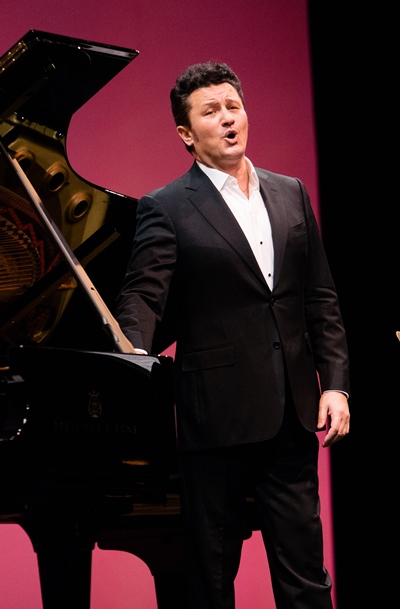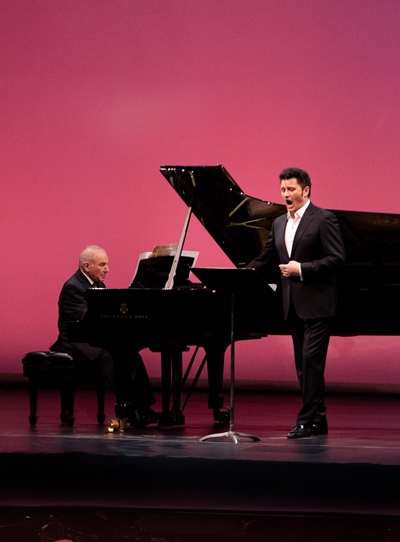In recital ranging from opera aria to art song, tenor Beczała shows why he’s a Lyric favorite
Review: Tenor Piotr Beczała in recital with pianist Martin Katz, on Feb. 25 at the Lyric Opera of Chicago.
By Mark T. Ketterson
An opportunity to savor the artistry of tenor Piotr Beczała through the intimacy of a song recital paid off in a vibrant vocal display Feb. 25 at the Lyric Opera of Chicago.
Lyric audiences have previously relished Beczała’s appearances in the title role of Gounod’s “Faust” and as Edgardo in Donizetti’s “Lucia di Lammermoor” – the latter a performance in which his ravishing vocalism rivaled that of such legendary predecessors in the role as Alfredo Kraus, Placido Domingo and Luciano Pavarotti.
 The first half of Beczała’s recital program, with the venerable pianist Martin Katz, was entirely devoted to classic Italian song. An account of Donaudy’s “Vaghissima sembianza” (Vague semblance) initiated proceedings and aptly displayed the tenor’s caressing legato.
The first half of Beczała’s recital program, with the venerable pianist Martin Katz, was entirely devoted to classic Italian song. An account of Donaudy’s “Vaghissima sembianza” (Vague semblance) initiated proceedings and aptly displayed the tenor’s caressing legato.
An achingly individual reading of the familiar “O del mio amato ben” (Oh, lost enchantment of my beloved) gave way to some Wolf-Ferrari, and then to a grouping of six selections by Respighi, in which Beczała’s gleaming upper register began to assert itself. “Lagrime” (Tears) was graced by a shimmering pianissimo, while the popular “Nebbie” (Mists) further displayed the tenor’s formidable dynamic control.
A Tosti group featured a perfectly calibrated middle voice in the concluding phrase of “Ideale” (Ideal), as Beczała’s sound spun to a golden thread, pliable yet absolutely firm.
If the Italian selections veered a bit toward drawing room fare, the more overtly dramatic Polish songs that rounded out the program found the singer in more brilliant mode. There was a stunning traversal of Szymanowski’s poignant Six Songs, Op. 2, that found Beczała resonating beautifully to native text.
Among four songs by Stanislaw Moniuszko, “Prząśniczka” (The spinner) was given an intense reading that contrasted sharply with the buoyant machismo of “Krakowiaczek ci ja” (I am from Cracow), which engendered an informal chorus of humming from some in the house.
 When enthusiastic applause followed each individual selection, never minding the formal structure of groupings, Beczała reacted with casual good humor – though as he attempted to sustain emotional continuity during the Szymanowski, he repeatedly raised his hand to curb the reaction. The adoring crowd was having none of it, however, and the tenor eventually conceded and simply greeted the approval with an indulgent smile.
When enthusiastic applause followed each individual selection, never minding the formal structure of groupings, Beczała reacted with casual good humor – though as he attempted to sustain emotional continuity during the Szymanowski, he repeatedly raised his hand to curb the reaction. The adoring crowd was having none of it, however, and the tenor eventually conceded and simply greeted the approval with an indulgent smile.
The afternoon’s most exciting singing came with the encores, which found Beczała in full operatic cry. “We have a nice opera aria for you,” he said humbly (the only time he spoke in the recital) before launching into a thrilling account of “La fleur que tu m’avais jetée” from Bizet’s “Carmen,” which exploited his laser-bright tone. Beczała’s passionate delivery of “Pourquoi me réveiller?” from Massenet’s “Werther” was altogether splendid, and virtually brought the house down as the performance concluded.
Katz was his excellent self throughout, with some especially nimble playing in Respighi’s “Pioggia” (Rain) and in the tricky syncopation of “Krakowiaczek ci ja.” The two men’s collaborative energy was palpable.
Related Link:
- The Lyric Opera’s spring season: Details at LyricOpera.org


